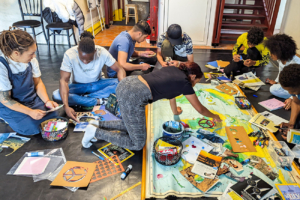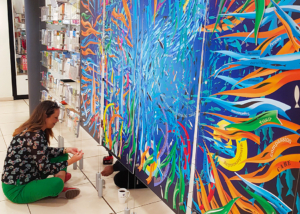People United

Futures of Care workshop with artist Catherine Chinatree and young refugees and asylum seekers from Kent Refugee Action Network.
People United is an arts charity based in Kent that believes in the power of care and kindness. Since its opening in 2006, People United has helped many communities in need.
Over the past few years, Kent became the main access point to the UK for many refugees and asylum seekers – the majority being young adults and unaccompanied minors, from various countries speaking different languages. How can these young people tell their stories? What do they want others to learn about them? How can they be supported in this new phase of their lives? These questions led People United to create a space where young people new to the UK could voice their thoughts and share the stories they wanted to.
Giving a voice to the unheard
As part of their multi-arts programme Futures of Care, People United has brought together the arts and community sectors to explore how welcome and care can be radically improved. They worked alongside Kent Refugee Action Network (KRAN) to co-create public artworks with young people, inviting refugees and asylum seekers aged 16 to 24 who had been separated from their families.
Sea of the Unseeable was developed in collaboration with artist Jamshid Maylanchi, two young producers Luwan and Mohammed, and other refugees. The project created two striking artworks which are still installed in Canterbury. The art pieces show the young people’s fears, hopes, stories, thoughts, and messages – giving their voices a new platform and prominence.
People United puts a lot of effort into listening and paying close attention to the communities they work with. CEO Janice McGuinness expressed that creating a mutual relationship of trust is a long and slow process, but necessary to deeply understand the needs and voices of the communities. “We talk about the importance of listening, deeply listening, the importance of paying attention, so that you can hear the things that are not being said.”
Refugees are often seen as a homogenous group. However, each person is an individual with different stories and experiences. Understanding their needs requires a lot of empathy and trust. It may not be easy for people that experienced traumas to express their feelings, or there might be language barriers that prevent it. Conscious of this, People United has tried to create an environment where young people feel welcome to own the space, shifting the usual power dynamics.

Installation of the young people’s artwork, Sea of the Unseeable at The Beaney Museum & Gallery in Canterbury.
Holding the space, but not the reigns
For People United, the best way to give the young people a voice is to step back and let them lead. In Sea of the Unseeable, Luwan, Mohammed, and the other young refugees became the project’s decision-makers, collaborating with each other and the artists. The young producers were the ones to commission the piece, following the process through each phase to make sure their message and vision were reflected in the artwork.
The impact of People United’s work is deep and personal to the individuals who participate. For Andrea Spisto, Creative Programmes Producer, seeing the two young producers evolve throughout the project was invaluable. Together they learned how to programme and how to communicate with artists. They developed their leadership skills and interpersonal skills. The same goes for the young people that participated. “We’ve seen people who spoke for the first time or participated in a workshop on their own. Certain things cannot be measured, like the smile on someone’s face,” Andrea said.
Thanks to the project, young refugees could make their voices heard through art and creativity and learn personal and practical skills that can be taken forward in the next chapter of their lives. Many have gone on to be advocates for the programme and some have gained jobs with KRAN. The learning is reciprocal – care providers, artists and People United have developed richer understanding and new ideas from working with the young people too.
By Maria Giulia Agusto, King’s College London Cultural & Creative Industries MA.
Other case studies